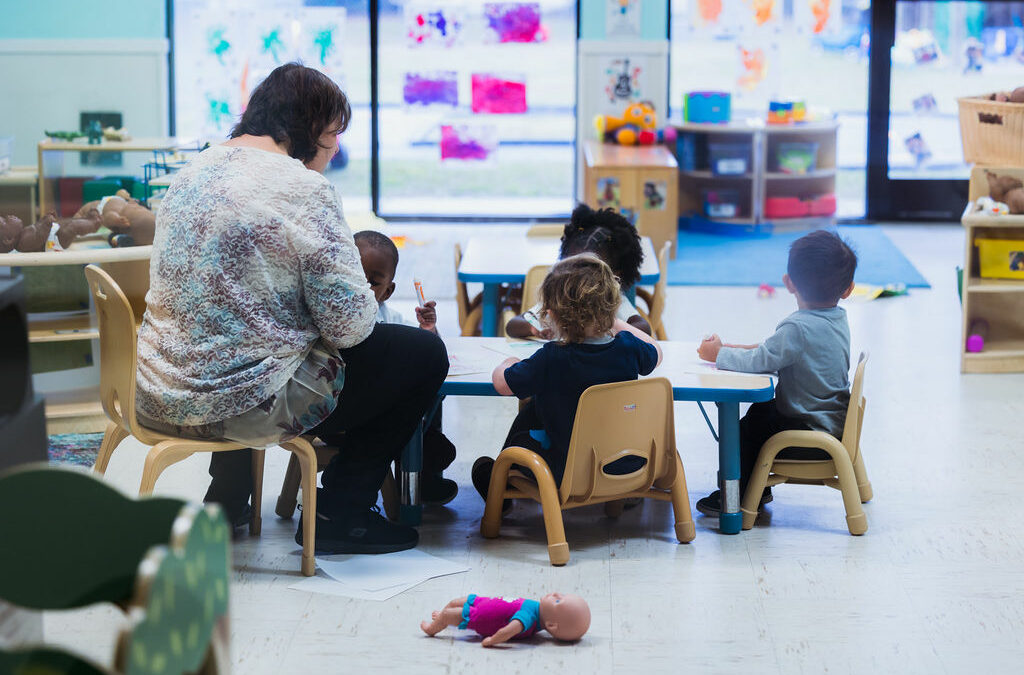Building a Foundation for Resilience: What Early Educators Should Know

As an early childhood educator, you’re likely familiar with the concept of resilience—one of the building blocks of a child’s early social-emotional development.
The most common factor for children who develop resilience skills is one stable and nurturing relationship with an adult, whether this be a supportive parent, caregiver, or educator. As a an early educator, understanding the importance of resilience and recognizing opportunities to build resilience for the children in your care is critical.
In addition to building the resilience of children in the classroom, educators must also prioritize their own resilience skills—which has a powerful impact on the children around you.
Keep reading to learn how to build resilience in your classroom, setting the children in your care up for success.
What is Child Resilience?
When children have resilience skills, they have the social and emotional abilities they need to face adversity. Instead of the common coping mechanisms, such as fight, flight, freeze, or fawn, they’re able to tap into their self-awareness, emotional regulation, and problem-solving to navigate situations.
No child is born with comprehensive resilience skills. Instead, resilience is built through the small, everyday moments. When a child is resilient, they’re able to view mistakes as an opportunity to learn—and recognize that effort develops knowledge and skill.
In contrast, children who are less resilient often see failure as permanent or out of their control and may have a deep fear of making mistakes.
How to Build A Foundation of Resilience for Children
- Provide helpful resources.
Building resilience happens when children engage in critical thinking and start to leverage resources around them. By creating classroom resources—even in tandem with the children in your care — provides outlets for problem-solving.
One example comes from NAEYC: In one instance, a teacher developed a chart named “Help for Writing,” which offered a list of resources for writing. This list included a wide array of resources, such as asking a friend, looking at a word wall, reviewing a poster, or asking the teacher.
This strategy encourages children how to navigate challenges by understanding what resources are available and choosing an option accordingly.
- Prioritize self-awareness and self-reflection.
When big emotions arise for the children in your care, teach them how to be self-aware and self-reflective. Many children may not understand why they feel upset, lash out, or shut down entirely.
When a child has difficulties understanding their own feelings, they will often struggle to relate to others.
As an early educator, you can help build awareness by drawing attention to their behavioral and somatic cues. This might mean saying something like, “I see you’re clenching your fists,” or “I notice your voice is getting louder.”
Signaling to the child how they’re reacting physically helps them become more attuned to their words, feelings, and actions.
- Value practice—not perfection.
Valuing the daily effort of the children in your care —not a perfect outcome—helps build resilience.
Prioritize practice and effort over perfection. This helps eliminate black-and-white thinking about good vs. bad art, writing, or creative practices, empowering children to engage with the process without attachment to a particular outcome.
- Be a good example
Setting a positive example for children in your care is critical. They need to see adults using healthy coping and communication behaviors—especially if they aren’t necessarily seeing these model behaviors at home.
Family Engagement
As an early educator, you can equip parents and caregivers with tools and resources to help children continue to develop resilience outside the classroom.
Consider putting together a short resource card to offer parents and caregivers:
- Encourage your child to try. Fear of failure is very common with children, particularly when society tends to prioritize talent over effort. Do not shield your child from early experiences with failure and disappointment. Instead, be supportive and encouraging of your child—which will help them develop perseverance, confidence, and dedication.
- Talk about mistakes as an opportunity to learn. As a parent, your approach to failure and mistakes will help define how your child responds to certain situations. When your child does make a mistake, respond with empathy, understanding, and encouragement. Avoid shame, blame, and criticism.
- Don’t solve your child’s problems for them. Making too many decisions or problem-solving for your child doesn’t help build resilience. Help your child analyze what happened and why, encouraging them to find a solution. Your questions should guide your child through this problem-solving process, but serve as their guide—not as their authority figure.
Our Impact
One Place is committed to developing new resources for early childhood educators, parents, and caregivers in Onslow County. By educating community members on the importance of social-emotional development and building resilience in the classroom, children are better equipped to navigate the ups and downs of life.
Learn more about our available resources for early educators here.
